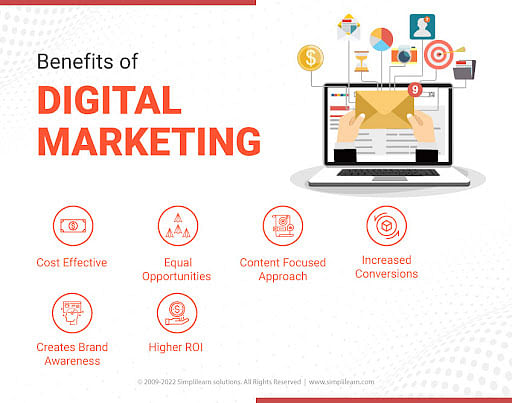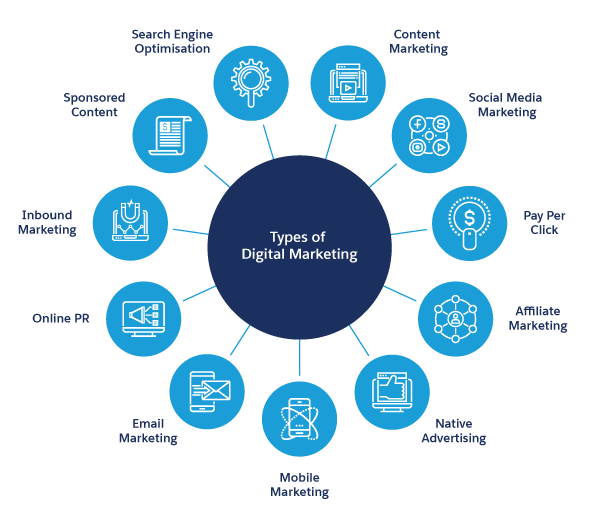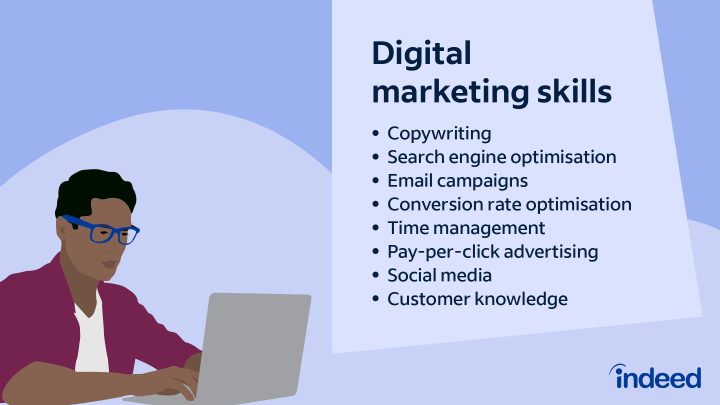What is Digital Marketing: The Ultimate Guide
Digital marketing utilizes digital technologies to promote products and services via the Internet and online platforms. It involves reaching potential customers through various digital channels like social media, email, and web advertising.
In today’s highly connected world, businesses leverage digital marketing strategies to engage with their target audiences effectively and drive business growth. Through methods such as search engine optimization, content marketing, and social media campaigns, companies can enhance their online presence and connect with customers in a more personalized and interactive manner.
Understanding digital marketing is crucial for businesses looking to stay competitive and relevant in the digital landscape. By implementing effective digital marketing tactics, organizations can reach a wider audience, increase brand visibility, and ultimately drive conversions and sales.

Credit: www.simplilearn.com
The Basics Of Digital Marketing
Digital marketing utilizes online platforms like websites and social media to promote products and services. It involves leveraging digital technologies to reach a wider audience and drive engagement for businesses.
Definition Of Digital Marketing
Digital marketing refers to the use of digital technologies such as computers, smartphones, and other digital media to promote products or services. It involves a range of techniques, including search engine optimization (SEO), content marketing, social media marketing, and email marketing. Unlike traditional marketing, digital marketing allows businesses to reach a global audience at a lower cost.Importance Of Digital Marketing
Digital marketing has become increasingly important for businesses of all sizes. With more people spending time online, it provides an effective way to reach potential customers and build brand awareness. Digital marketing also allows businesses to target their audience more precisely and measure the success of their campaigns. By analyzing data from website traffic, social media engagement, and other metrics, businesses can optimize their digital marketing strategies to achieve better results. Digital marketing encompasses a wide range of techniques and strategies. Some of the most important channels include:- Search engine optimization (SEO): This involves optimizing your website and content to rank higher in search engine results pages (SERPs). By targeting keywords that your audience is searching for, you can drive more traffic to your site.
- Social media marketing: This involves using social media platforms such as Facebook, Twitter, and Instagram to promote your brand and engage with your audience. By sharing content and interacting with users, you can build a loyal following and increase brand awareness.
- Email marketing: This involves sending promotional emails to your subscribers to keep them engaged and informed about your products or services. By offering exclusive discounts and other incentives, you can encourage them to make a purchase.
- Content marketing: This involves creating and sharing valuable content such as blog posts, videos, and infographics to attract and retain a clearly defined audience. By providing helpful information, you can establish yourself as an authority in your industry and build trust with your audience.
- Search engine marketing (SEM): This involves using paid advertising to appear at the top of search engine results pages. By bidding on keywords related to your business, you can drive more traffic to your site and increase conversions.

Credit: www.salesforce.com
Digital Marketing Channels
Websites
Websites are the foundation of digital marketing. It is crucial to have a well-designed, user-friendly website that represents your brand and provides valuable content to visitors. A website acts as a hub where potential customers can learn about your products or services, make purchases, and engage with your brand.
Search Engine Optimization
Search Engine Optimization (SEO) is the process of optimizing your website to rank higher in search engine results pages. By improving your website’s visibility on search engines, you can attract more organic traffic and increase your chances of reaching potential customers.
Social Media
Social media platforms provide an excellent opportunity to engage with your target audience, build brand awareness, and drive traffic to your website. With the right social media strategy, you can create meaningful connections with your followers and convert them into loyal customers.
Email Marketing
Email marketing allows you to reach out to your audience directly, delivering personalized messages and promotions to their inbox. It is a powerful channel for nurturing leads, retaining customers, and driving conversions through targeted and relevant content.
Search Engine Marketing
Search Engine Marketing (SEM) involves promoting your website by increasing its visibility in search engine results pages through paid advertising. By utilizing pay-per-click (PPC) campaigns, you can target specific keywords and demographics to reach potential customers at the right moment.
Content Marketing
Content marketing focuses on creating and distributing valuable, relevant, and consistent content to attract and retain a clearly defined audience. By producing high-quality content, you can establish your brand as an authority in your industry, drive organic traffic, and nurture customer relationships.
Understanding The Marketing Funnel
Digital marketing is a strategic approach that leverages online platforms and technologies to promote products and services. One of the fundamental concepts in digital marketing is the marketing funnel, which maps the customer journey from initial awareness to making a purchase decision. Understanding the marketing funnel is crucial for businesses to effectively engage and convert potential customers. The marketing funnel comprises several key stages, each requiring specific strategies to guide prospects through the buying process. These stages include Awareness, Interest, Desire, and Action.
Awareness
The awareness stage is where potential customers become familiar with a brand or product. At this point, the focus is on creating visibility and capturing the attention of the target audience. Strategies such as search engine optimization (SEO), content marketing, and social media advertising play a pivotal role in building brand awareness and attracting prospects to the brand’s offerings.
Interest
Once the audience is aware of the brand, the interest stage aims to cultivate curiosity and engagement. Content marketing, email campaigns, and targeted social media content are essential in nurturing the audience’s interest and providing valuable information that resonates with their needs and preferences.
Desire
During the desire stage, the goal is to stimulate a strong inclination towards the product or service. This is achieved through persuasive content, testimonials, and personalized offers that showcase the unique value proposition of the brand. Engaging storytelling and compelling visuals can significantly influence the audience’s desire to make a purchase.
Action
The action stage is the culmination of the marketing funnel, where the prospect takes the desired action, such as making a purchase or signing up for a service. This stage requires clear calls-to-action, seamless user experience, and optimized conversion paths to facilitate the decision-making process and drive conversions.
Roles And Responsibilities
Digital marketing professionals play a crucial role in leveraging various online platforms to promote products and services. Their responsibilities encompass a broad spectrum of digital media, including social media, search engines, email marketing, content creation, and online advertising. The primary objective is to engage target audiences and achieve business goals through digital channels.
Scope Of A Digital Marketer’s Role
The scope of a digital marketer’s role is extensive, involving diverse strategies and tactics to reach and engage audiences effectively. Their responsibilities include:
- Developing and implementing digital marketing campaigns
- Utilizing social media platforms for brand promotion and customer engagement
- Optimizing content for search engines to enhance visibility
- Creating and managing email marketing campaigns
- Measuring and analyzing digital marketing performance
Challenges For Beginners
Beginners in digital marketing may encounter several challenges as they navigate this dynamic field. Some common hurdles include:
- Understanding the complex landscape of digital marketing tools and platforms
- Keeping pace with evolving digital marketing trends and algorithms
- Developing effective strategies to engage and retain online audiences
- Navigating the intricacies of data analytics and performance metrics
Types Of Digital Marketing
Digital marketing utilizes online platforms like websites, social media, and email to promote products and services. It involves various strategies such as search engine optimization, content marketing, and email campaigns to connect with customers and drive engagement.
Types of Digital Marketing Digital marketing is a vast and constantly evolving field that includes various types of marketing strategies and techniques. Here are some of the most common types of digital marketing that businesses use to promote their products and services: H3: Content Marketing Content marketing is a marketing strategy that involves creating and distributing valuable and relevant content to attract and engage a target audience. This type of marketing can include blog posts, articles, videos, podcasts, and social media posts. The goal of content marketing is to build brand awareness, establish trust and credibility, and drive profitable customer actions. H3: Search Engine Optimization (SEO) Search Engine Optimization, or SEO, is the practice of optimizing a website to improve its ranking in search engine results pages. This is done through a variety of techniques, such as keyword research, on-page optimization, link building, and content creation. The goal of SEO is to increase organic traffic to a website and improve its visibility and credibility in the eyes of search engines. H3: Search Engine Marketing (SEM) Search Engine Marketing, or SEM, is a type of digital marketing that involves using paid advertising to promote a website in search engine results pages. This can include pay-per-click advertising, display advertising, and retargeting. The goal of SEM is to increase website traffic and conversions by targeting specific keywords and audiences. H3: Social Media Marketing (SMM) Social Media Marketing, or SMM, is a type of digital marketing that involves using social media platforms to promote a brand or product. This can include creating and sharing content, running social media ads, and engaging with followers. The goal of SMM is to build brand awareness, increase website traffic, and improve customer engagement and loyalty. In conclusion, digital marketing is a multifaceted field that includes various types of marketing strategies and techniques. By understanding and utilizing these different types of digital marketing, businesses can effectively reach and engage their target audience, drive traffic to their website, and ultimately, increase their bottom line.
Credit: uk.indeed.com
Benefits And Examples Of Digital Marketing
Digital marketing offers a wide array of benefits for businesses, enabling them to reach and engage with their target audience in a more efficient and cost-effective manner. Through various digital channels, businesses can effectively promote their products and services, as well as connect with potential customers on a personal level. Let’s explore some of the key advantages and examples of digital marketing.
Promotion Of Products And Services
The primary goal of digital marketing is to promote products and services through online platforms, reaching a wider audience compared to traditional marketing methods. By leveraging channels such as social media, search engine optimization (SEO), and email marketing, businesses can effectively showcase their offerings to potential customers. This allows for targeted and personalized promotional strategies, ultimately leading to increased brand visibility and sales.
Connecting With Potential Customers
Another significant benefit of digital marketing is the ability to connect with potential customers on a more personal level. Through engaging content, interactive social media posts, and targeted advertising, businesses can establish meaningful connections with their audience. This direct interaction fosters trust and loyalty, leading to higher customer retention and satisfaction.
Frequently Asked Questions
What Is Digital Marketing In Simple Words?
Digital marketing uses online platforms like websites and social media to promote products and services to customers.
What Exactly Does A Digital Marketer Do?
A digital marketer uses online platforms to promote products and services, connecting with target audiences to achieve business goals.
Is Digital Marketing Easy For Beginners?
Digital marketing can be challenging for beginners due to the need to learn search engines and analytics.
What Are The Four Types Of Digital Marketing?
Digital marketing includes Content Marketing, SEO, SEM, and SMM to promote products and services online.
Conclusion
In essence, digital marketing utilizes online platforms to promote products and services, connecting with potential customers through various digital channels. By incorporating strategies like SEO, SEM, SMM, and content marketing, businesses can effectively engage audiences and drive success in the digital landscape.







